上海牛津版高一上学期期末复习讲义
上海牛津版英语高一第一学期
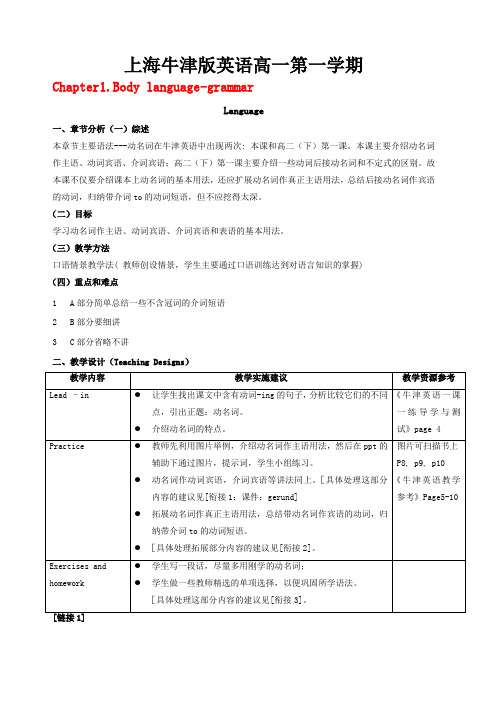
上海牛津版英语高一第一学期Chapter1.Body language-grammarLanguage一、章节分析(一)综述本章节主要语法---动名词在牛津英语中出现两次: 本课和高二(下)第一课。
本课主要介绍动名词作主语、动词宾语、介词宾语;高二(下)第一课主要介绍一些动词后接动名词和不定式的区别。
故本课不仅要介绍课本上动名词的基本用法,还应扩展动名词作真正主语用法,总结后接动名词作宾语的动词,归纳带介词to的动词短语,但不应挖得太深。
(二)目标学习动名词作主语、动词宾语、介词宾语和表语的基本用法。
(三)教学方法口语情景教学法( 教师创设情景,学生主要通过口语训练达到对语言知识的掌握)(四)重点和难点1A部分简单总结一些不含冠词的介词短语2B部分要细讲3C部分省略不讲二、教学设计(Teaching Designs)1Ask students to find the sentences which have the form of v.+ing in the text .(possible answers):He gave an encouraging smile.Communicating is more than speaking and listening.She is holding her head up.2Explain the meaning and features of gerunds.Gerunds are –ing nouns. It is a kind of nouns. So in the above sentences, only “communicating, speaking, and listening” are gerunds. As a noun, geru nds can be used as subject, verb object, preposition object, predicative and attributive.Step Two Presentation1Gerunds as subjects1)Example:T: What does shaking hands mean?S1: Shaking hands is a sign of friendship.S2: Shaking hands means that you are friendly.(动名词作主语时,位于动词用单数)2)PracticeStudents practise according to the example. They work in pairs. S1 makes questions using the pictures and turning the verbs in brackets into –ing nouns. S2 chooses answers from the box.Shaking your fist is a sign of anger.Sighing is a sign of sadness.Yawning means that you are sleepy.Closing your eyes means that you are thinking.Whistling means that you are happy.Scratching your head means that you are thinking.Bowing is a sign of respect.(补充讲解句型It is (was) no use/good doing something.)2Gerund as verb objects1)Example:T: I didn’t know you could swim.S: Didn’t you? I love/ like swimming.T: So do I. I really enjoy swimming.I don’t. I hate / dislike swimming.I prefer walking.2)Practice:Students work in pairs to make similar dialogues about the pictures. Follow theexample.3)Tell students some other verbs which have such usages.admit, appreciate, avoid, be worth, complete, finish, deny, delay, postpone,escape, practice, suggest, miss, allow, permit, forbid, consider, imagine3Gerunds after prepositionsOn her first day at work, Debbie saw the things. She didn’t know what they were for,so she asked Mr Yang.Work in pairs to complete their conversation. S2 should answer S1, using –ing nounsmade from the verbs in the box along with “for”.1)Example:T: Excuse me, but what are these _keys_____ for?S: They’re _for____ __locking_____ the drawers of the desk.2)Practice:Students work in pairs to make similar dialogues about the pictures. Follow theexample.S1: And this _______?S2: It’s _______ ________ letters.S1: What about these _______ ________?S2: They’re _______ ________ your paper together.S1: This ________. What’s it for?S2: It’s _______ _______ the dates on documents.S1: And these ________?S2: They’re _______ ________. They’re a present for your first day at work.( 补充总结含介词to的动词短语:be (get)used to, get down to, look forward to, lead to, pay attention to, be devoted to, object to例如:Let’s get down t o talking about your future.I’m look forward to hearing from you.)(见课件:gerund)[链接2]13)It’s worth doing…4)…can’t help doing…〖典型例句〗1)It’s no use crying over the spilt milk.2)The place is well worth visiting again.3)There is no point cheating in the exam.4)We can’t help laughing at the joke.5)It’s no good copying others’ homework. 2下列动词后常接动名词做宾语1)admit, appreciate, avoid2)complete, consider3)delay, deny4)endure/stand, enjoy, escape, excuse5)finish6)imagine7)keep8)mind, miss9)postpone, practice10)resist, risk11)suggest巧记这些动词的诀窍:继续坚持勿停止;盼望完成莫推迟错过成功会后悔;惯于冒险须放弃避免原谅不逃脱;忙于欣赏禁不住介意练习很值得;考虑建议末延迟想象无用已无益;记得做过勿忘记禁止使用不定式〖典型例句〗1)I enjoy reading books in bed though it is not a good habit.2)I can’t imagine going to any place without you.3)Would you mind opening the door for me?4)He suggests reading English every day.5)The bird missed being shot.6)He escaped being punished by running away.3下列动词短语种to为介词1)be (get)used to2)get down to3)look forward to4)pay attention to5)be devoted to6)object to7)lead to〖典型例句〗1)I used to get up late, but now I’m used to getting up early.2)After discussing with his deskmate, he got down to writing his composition.3)I’m looking forward to hearing from you.以下几点可以在以后单元里讲解:1)need/ want / require 句型2)love, like, hate 后接 to do 与doing 作宾语的区别3)stop, remember, regret, try, mean, go on, forget后接 to do 与doing 作宾语的区别4)allow, permit, consider, advise后接 to do 与doing 作宾语和宾补的区别5)动名词的时态和语态6)动名词的复合结构[链接3]Ⅰ 单选:1.Do keeping _____, will you?A. to tryB. tryC. having triedD. trying2. We are all looking forward ______ Mr. Smith next week.A. to seeB. of seeingC. at seeingD. to seeing3. He spent all his time ______ for the final examination.A. to prepareB. of preparingC. in preparingD. to preparing4. The boy is only five years old, but he is quite used _____ the telephone.A. to answerB. to answeringC. of answeringD. by answering5. ______soundly is better for your illness than taking medicine.A. To sleepB. SleepingC. SleepD. Having slept6. Sometimes when I look into the sky, I feel like ______ a trip somewhere.A. to makeB. makingC. makeD. to go for7. I consider _____ of every fish is a kind of murder.A. takingB. a takingC. the takingD. to take8. My grandfather is a rich man, but ______ money does not solve all his problems.A. hasB. to haveC. havingD. having had9. It is no good ______ him to see you off.A. to expectB. expectingC. of expectingD. for him to expect10.There is one more book worth ______.A. readB. of readingC. being readD. reading11.He liked ______ many questions at the press conference.A. being askedB. askingC. of askingD. ask12.We had no trouble ______ the path through the forest.A. to findB. for findingC. findingD. with findingII.用括号里的动词的正确形式填空:1. He insisted on _______(do )the work in some other way.2. The windows want / need / require to be cleaned. That is, they need / want / require_____ (clean).3. He practiced _______(play) the piano every day.4. She doesn’t mind ______( work ) overtime.5. It will mean ______( benefit ) your company and mine.6. Have you decided to put off ______( go ) to the seaside?7. Peter kept (on) ______ (ask) questions.8. It’s a waste of time ______( argue) about it.9. _____ ( talk ) is easier than doing.10. Have you finished _______ (do) your homework?III.翻译:1. ______(每天晨读一刻钟)is very important in learning English.2. It’s no use _______(叹气).3. Debbie enjoys _______(微笑着与客户交流).4. John has just given up ______(吸烟).5. I ______(一直盼望着访问)China again.6. He run off to avoid ______(看见)by his class teacher.7. This machine is for ______(切纸).8. This book is well worth ______(读).9. ______(挥动拳头)is a sign of anger.10. Mr. Yang suggested/advised ______ (看着顾客的眼睛)to make a good impression on him. IV.拓展题:1.---You were brave enough to raise objections at the meeting.---Well, now I regret _____that.A. to doB. to be doingC. to have doneD. having done2.The patient was warned _____ oily food after the operation.A. to eat notB. eating notC. not to eatD. not eating3.She looks forward every spring to _____ the flower-lined garden.A. visitB. paying a visitC. walk inD. walking in4.The little time we have together we try _____ wisely.A. spending itB. to spend itC. to spendD. spending that5.While shopping, people sometimes c an’t help ______ into buying something they don’t really need.A. to persuadeB. persuading D. being persuaded D. be persuaded6.What worried the child most was ______ to visit his mother in the hospital.A. his not allowingB. his not being allowedC. his being not allowedD. having not been allowed7.Tony was very unhappy for _____ to the party.A. having not been invitedB. not having invitedC. having not invitedD. not having been invited8._____ to su nlight for too much time will do harm to one’s skin.A. ExposedB. Having exposedC. Being exposedD. After being exposed9.The discovery of new evidence led to _____.A. the thief having caughtB. catch the thiefC. the thief being caughtD. the thief to be caught10.One learns a language by making mistakes and _____ them.A. correctB. correctingC. correctsD. to correct11.---You should have thanked her before you left.---I meant _____, but when I was leaving I couldn’t find her anywhere.A. to doB. toC. doingD. doing12.In some parts of London, missing a bus means_____ for another hour.A. waitingB. to waitC. waitD. to be waiting13.---What’s made John so angry?---______ the tickets for the concert.A. LoseB. To loseC. Because of losingD. Losing14. The day we are looking forward to _______ at last.A. arrivingB. arriveC. arrived D. arrives15. Mr. Reed made up his mind to devote all he had to ____ some schools for poor children.A. set upB. setting upC. have set upD. having set up附答案:Ⅰ.单选:DDCBBBCCBDBCⅡ.用括号里的动词的正确形式填空:doing, cleaning, playing, working, benefiting,going, asking, arguing, Talking, doingⅢ.翻译:1.Reading for a quarter of an hour every morning2.sighingmunicating with customers with a smile4.smoking5.am looking forward to visiting6.being seen7.cutting up paper8.reading9.Shaking one’s fist10.looking at customers’ eyesⅣ.拓展题:DCDBD BDCCB BADCBChapter2. Care for hair-More Reading教案一、章节分析(Reading section)(一)阅读地位(Reading Position)1)more language input同样围绕着头发这个主题,但给学生提供了一些额外的相关信息。
第1讲:定语从句 牛津上海版英语高一语法复习讲义(教师版)
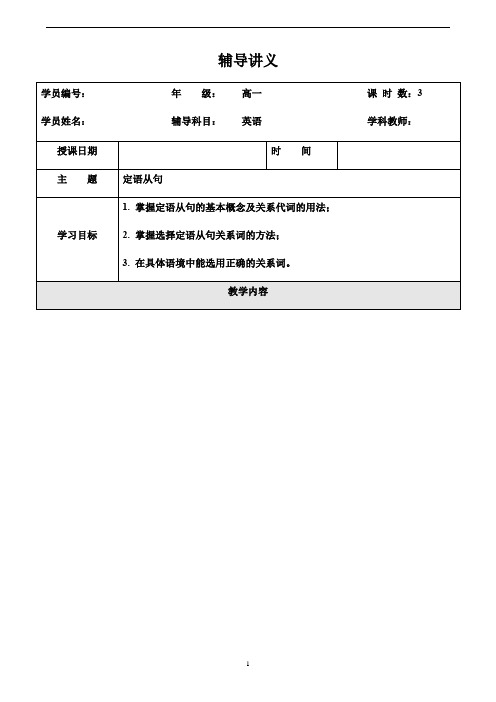
辅导讲义备注:学生结合图理解上面两句话,可以让学生对定语从句的构成有个大致的了解,学生的注意力会慢慢的转向定语从句的构成,如先行词、连词和从句。
3、先行词:被定语从句修饰的名词或代词。
如上面例句和图中的the team ,the man 。
4、关系词:引导定语从句的关联词称为关系词,关系词有关系代词和关系副词关系代词:that, which, who, whom, whose, as关系副词:where, when, whyEg : [She is the very beautiful girl ] [that I love best.]【知识梳理2】基本分类1、限制性定语从句:对先行词起限制修饰作用,是不可缺少的成分,去掉之后主句意义不完整。
2、非限制性定语从句:先行词与定语从句往往有逗号隔开,是对主句的补充说明,如果去掉,应该对整个句意没有影响。
非限定定语从句相当于并列句,状语从句等。
Eg: 1、This is the house which we bought last month.这是我们上个月买的那幢房子。
(限制性)Eg. 2、The house, which we bought last month, is very nice.这幢房子很漂亮,是我们上个月买的。
(非限制性)先行词 关系词主句 关系从句3. 表示所有格:whose (既表示人的所有也表示物的所有)<1> 表示人的所有eg: The girl whose father is a model worker is our monitor.<2> 表示物的所有eg: I’d like a room whose window looks out over the sea.<3>当关系代词whose指物时可以用“of + which”替换;即,whose + n=the + n + of which=of which + the + n【巩固练习】1) He is the athlete ______ left arm was broken during the match.2) The house ________doors and windows are all made of steel are used to store daily necessities.3) Guilin is one of the cities _______scenery attracts millions of visitors each year.4) Children who are not active or diet is high in fat will gain weight quickly.5) The people, ________homes had been damaged by the flood, were given help by the Red Cross. Keys: whose whose whose whose whose4. as引导定语从句的用法:①as引导限制性定语从句通常用于the same … as, such(so) … as结构中。
上海牛津英语高一讲义Unit2同步复习
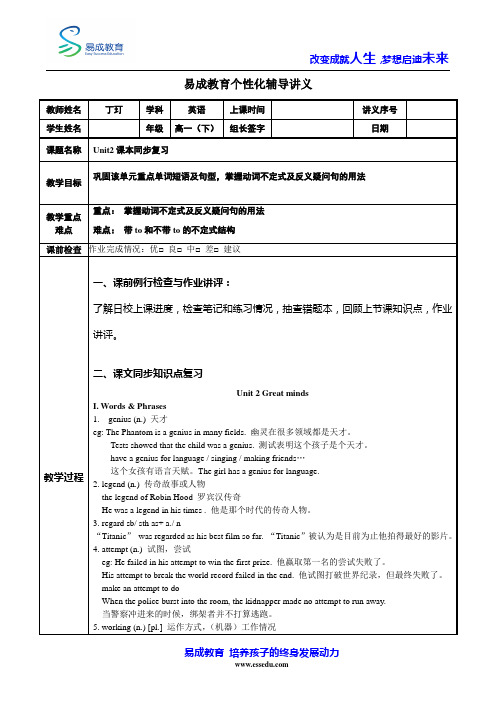
易成教育个性化辅导讲义教师姓名丁玎学科英语上课时间讲义序号学生姓名年级高一(下)组长签字日期课题名称Unit2课本同步复习教学目标巩固该单元重点单词短语及句型,掌握动词不定式及反义疑问句的用法教学重点难点重点:掌握动词不定式及反义疑问句的用法难点:带to和不带to的不定式结构课前检查作业完成情况:优□ 良□ 中□ 差□ 建议__________________________________________教学过程一、课前例行检查与作业讲评:了解日校上课进度,检查笔记和练习情况,抽查错题本,回顾上节课知识点,作业讲评。
二、课文同步知识点复习Unit 2 Great mindsI. Words & Phrases1. genius (n.) 天才eg: The Phantom is a genius in many fields. 幽灵在很多领域都是天才。
Tests showed that the child was a genius. 测试表明这个孩子是个天才。
have a genius for language / singing / making friends…这个女孩有语言天赋。
The girl has a genius for language.2. legend (n.) 传奇故事或人物the legend of Robin Hood 罗宾汉传奇He was a legend in his times . 他是那个时代的传奇人物。
3. regard sb/ sth as+ a./ n“Titanic”was regarded as his best film so far. “Titanic”被认为是目前为止他拍得最好的影片。
4. attempt (n.) 试图,尝试eg: He failed in his attempt to win the first prize. 他赢取第一名的尝试失败了。
上海新教材牛津英语高一上学期英语教案

高一上学期英语讲义Chapter1.Body language Reading章节分析(Reading section )综述本章节通过Debbie和Simon 接人待物时的成功与失败,来说明肢体语言的重要性。
在引导学生对文章进行整体理解同时,培养学生良好的礼仪。
本课的任务有两个:1 对课文进行整体阅读。
培养学生略读(获取大意)、扫读(整理有关信息)、细读(分析篇章结构,慨括中心)等阅读能力。
2 与时俱进。
结合课文以及上海迎世博倡导学礼仪的活动,引导学生畅谈作为东道主该用何种BodyLanguage来迎接四方宾客。
(二)阅读目标1 知识目标:学习课文中重点词、词组、句型和语法。
2 能力目标:提高学生的阅读理解能力和培养学生的阅读技巧。
阅读准备(收集相关资料)、略读(获取大意)、扫读(整理有关信息)、细读(分析篇章结构,慨括中心)等是高中学生必须具备的阅读技能,教师对高一新生可以以本课为例作仔细介绍。
3 情感目标:帮助学生对“body language”有更深入的思考,学会礼貌接人待物。
(三)重点和难点词汇学习1) 核心词汇●senior●appearance●express/expression●impress/impression●middle-aged, well-dressed, part-time●communicate/communication●opposite●greet●cheerful●employ (employer, employee)●colleague●customer●gesture2) 拓展词汇●sigh●fax●headline (练习D中)●heading3) 词组和短语●glance at,●get down to,●give sb. a good impressi on, make a good impression on…,●without hesitation,●hold up,●prefer…to, would rather do…2 句型学习1)look ( sound, smell, taste, feel) + adj.2)make sb. +v.原形1介绍高中教材的特点,介绍阅读中skimming 和scanning的含义与技巧.1) What is skimming?Skimming is a reading strategy. When we skim a piece of reading, we read it very quickly inorder to get the general idea of the reading. When we skim, we skip the unimportant parts. Therefore, when we skim, we usually only look at titles and headings, pictures and diagrams, and important sentences (usually the first and last sentences of a paragraph) in the reading. Skimming takes only a minute or two, and it helps us get the general outline of the reading and follow the writer’s idea more easily. It is a way to prepare us for a better and detailed understanding of the writer’s ideas.略读是一种阅读方式。
牛津上海高一版-17页文档资料

ck of protein and iron makes your hair less shiny. lack n.&vt.
They failed for lack of funds./because of lack of funds.
3.Problem hair is often a result of an unhealthy diet and lifestyle. result n.
The students were eager to know the result of the examination.
The flight was delayed as a result of fog. Hard work results in success. His failure results from his laziness.
Language points in more reading:
1. Some people have a lot of hair while others have a little.
2. While: 3. I drink black coffee while he prefers it with
Stress in your life can also secretly rob your hair of its shiny beauty. 5.What can hurt your hair after you shampoo it?
Rubbing your hair quickly when drying it can damage it.
第10讲:语法填空专题和Unit 1 牛津上海版英语高一语法复习讲义(教师版)
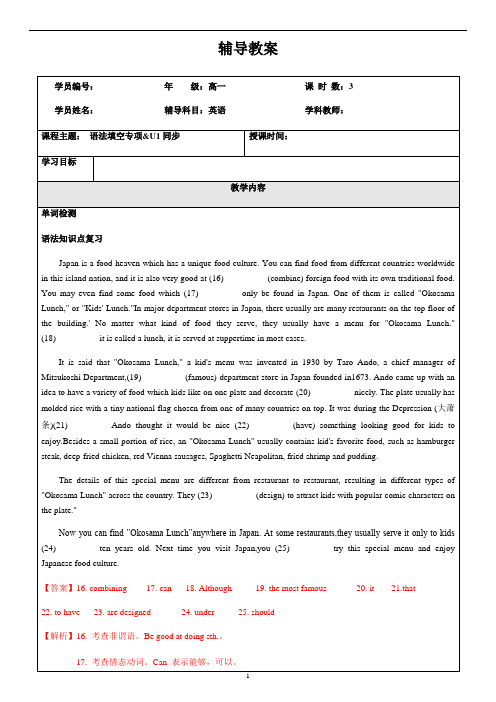
学员编号:年级:高一课时数:3
学员姓名:辅导科目:英语学科教师:
课程主题:语法填空专项&U1同步
授课时间:
学习目标
教学内容
单词检测
语法知识点复习
Japan is a food heaven which has a unique food culture. You can find food from different countries worldwide in this island nation, and it is alsovery good at(16)__________(combine) foreign food with its own traditional food. You may even find some food which(17)__________only be found in Japan. One of them is called "Okosama Lunch," or "Kids' Lunch."In major department stores in Japan, there usually are many restaurants on the top floor of the building.' No matter what kind of food they serve, they usually have a menu for "Okosama Lunch." (18)__________it is called a lunch, it is served at suppertime in most cases.
18.考查让步状语从句。虽然它被称为午餐,但在大多数情况下它是在晚餐时间供应的。
上海牛津版英语高一第一学期
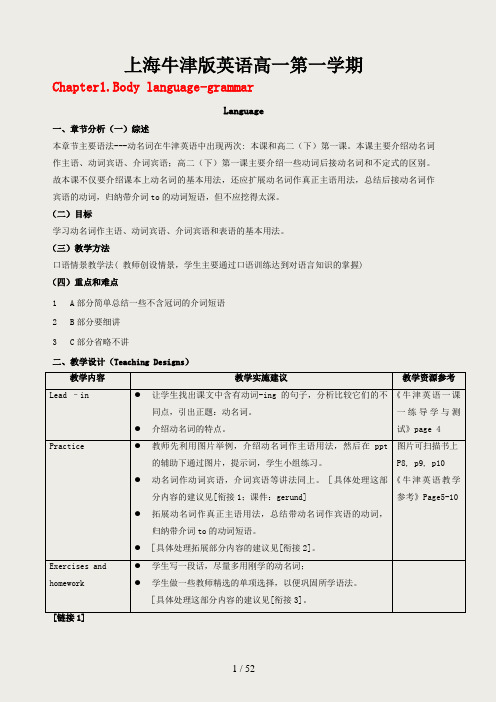
上海牛津版英语高一第一学期Chapter1.Body language-grammarLanguage一、章节分析(一)综述本章节主要语法---动名词在牛津英语中出现两次: 本课和高二(下)第一课。
本课主要介绍动名词作主语、动词宾语、介词宾语;高二(下)第一课主要介绍一些动词后接动名词和不定式的区别。
故本课不仅要介绍课本上动名词的基本用法,还应扩展动名词作真正主语用法,总结后接动名词作宾语的动词,归纳带介词to的动词短语,但不应挖得太深。
(二)目标学习动名词作主语、动词宾语、介词宾语和表语的基本用法。
(三)教学方法口语情景教学法( 教师创设情景,学生主要通过口语训练达到对语言知识的掌握)(四)重点和难点1A部分简单总结一些不含冠词的介词短语2B部分要细讲3C部分省略不讲二、教学设计(Teaching Designs)教学内容教学实施建议教学资源参考Lead –in ●让学生找出课文中含有动词-ing的句子,分析比较它们的不同点,引出正题:动名词。
●介绍动名词的特点。
《牛津英语一课一练导学与测试》page 4Practice ●教师先利用图片举例,介绍动名词作主语用法,然后在ppt的辅助下通过图片,提示词,学生小组练习。
●动名词作动词宾语,介词宾语等讲法同上。
[具体处理这部分内容的建议见[衔接1;课件:gerund]●拓展动名词作真正主语用法,总结带动名词作宾语的动词,归纳带介词to的动词短语。
●[具体处理拓展部分内容的建议见[衔接2]。
图片可扫描书上P8, p9, p10 《牛津英语教学参考》Page5-10Exercises and homework ●学生写一段话,尽量多用刚学的动名词;●学生做一些教师精选的单项选择,以便巩固所学语法。
[具体处理这部分内容的建议见[衔接3]。
[链接1]说明:这是一份关于动名词的基础教学的教案与课件。
Step One lead-in1Ask students to find the sentences which have the form of v.+ing in the text .(possible answers):He gave an encouraging smile.Communicating is more than speaking and listening.She is holding her head up.2Explain the meaning and features of gerunds.Gerunds are –ing nouns. It is a kind of nouns. So in the above sentences, only “communicating, speaking, and listening” are gerunds. As a noun, gerunds can be used as subject, verb object, preposition object, predicative and attributive. Step Two Presentation1Gerunds as subjects1)Example:T: What does shaking hands mean?S1: Shaking hands is a sign of friendship.S2: Shaking hands means that you are friendly.(动名词作主语时,位于动词用单数)2)PracticeStudents practise according to the example. They work in pairs. S1 makesquestions using the pictures and turning the verbs in brackets into –ingnouns. S2 chooses answers from the box.Shaking your fist is a sign of anger.Sighing is a sign of sadness.Yawning means that you are sleepy.Closing your eyes means that you are thinking.Whistling means that you are happy.Scratching your head means that you are thinking.Bowing is a sign of respect.(补充讲解句型It is (was) no use/good doing something.)2Gerund as verb objects1)Example:T: I didn’t know you could swim.S: Didn’t you? I love/ like swimming.T: So do I. I really enjoy swimming.I don’t. I hate / dislike swimming.I prefer walking.2)Practice:Students work in pairs to make similar dialogues about the pictures. Followthe example.3)Tell students some other verbs which have such usages.admit, appreciate, avoid, be worth, complete, finish, deny, delay, postpone,escape, practice, suggest, miss, allow, permit, forbid, consider, imagine3Gerunds after prepositionsOn her first day at work, Debbie saw the things. She didn’t know what they werefor, so she asked Mr Yang.Work in pairs to complete their conversation. S2 should answer S1, using –ingnouns made from the verbs in the box along with “for”.1)Example:T: Excuse me, but what are these _keys_____ for?S: They’re _for____ __locking_____ the drawers of the desk.2)Practice:Students work in pairs to make similar dialogues about the pictures. Followthe example.S1: And this _______?S2: It’s _______ ________ le tters.S1: What about these _______ ________?S2: They’re _______ ________ your paper together.S1: This ________. What’s it for?S2: It’s _______ _______ the dates on documents.S1: And these ________?S2: They’re _______ ________. They’re a present for y our first day at work.( 补充总结含介词to的动词短语:be (get)used to, get down to, look forward to, lead to, pay attention to, be devoted to, object to例如:Let’s get down to talking about your future.I’m loo k forward to hearing from you.)(见课件:gerund)[链接2]说明:这是动名词的拓展部分,拓展了动名词句型、接动名词做宾语的一些动词、接动1下列句型后用动名词1)It’s no use / good doing…2)There is no point (in) doing …3)It’s worth doing…4)…can’t help doing…〖典型例句〗1)It’s no use crying over the spilt milk.2)The place is well worth visiting again.3)There is no point cheating in the exam.4)We can’t help laughing at the joke.5)It’s no good copying others’ homework.2下列动词后常接动名词做宾语1)admit, appreciate, avoid2)complete, consider3)delay, deny4)endure/stand, enjoy, escape, excuse5)finish6)imagine7)keep8)mind, miss9)postpone, practice10)resist, risk11)suggest巧记这些动词的诀窍:继续坚持勿停止;盼望完成莫推迟错过成功会后悔;惯于冒险须放弃避免原谅不逃脱;忙于欣赏禁不住介意练习很值得;考虑建议末延迟想象无用已无益;记得做过勿忘记禁止使用不定式〖典型例句〗1)I enjoy reading books in bed though it is not a good habit.2)I can’t imagine going to any place without you.3)Would you mind opening the door for me?4)He suggests reading English every day.5)The bird missed being shot.6)He escaped being punished by running away.3下列动词短语种to为介词1)be (get)used to2)get down to3)look forward to4)pay attention to5)be devoted to6)object to7)lead to〖典型例句〗1)I used to get up late, but now I’m used to getting up early.2)After discussing with his deskmate, he got down to writing his composition.3)I’m looking forward to hearing from you.以下几点可以在以后单元里讲解:1)need/ want / require 句型2)love, like, hate 后接 to do 与doing 作宾语的区别3)stop, remember, regret, try, mean, go on, forget后接 to do 与doing 作宾语的区別4)allow, permit, consider, advise后接 to do 与doing 作宾语和宾补的区别5)动名词的时态和语态6)动名词的复合结构[链接3]说明:Ⅰ 单选:1.Do keeping _____, will you?A. to tryB. tryC. having triedD. trying2. We are all looking forward ______ Mr. Smith next week.A. to seeB. of seeingC. at seeingD. to seeing3. He spent all his time ______ for the final examination.A. to prepareB. of preparingC. in preparingD. to preparing4. The boy is only five years old, but he is quite used _____ the telephone.A. to answerB. to answeringC. of answeringD. by answering5. ______soundly is better for your illness than taking medicine.A. To sleepB. SleepingC. SleepD. Having slept6. Sometimes when I look into the sky, I feel like ______ a trip somewhere.A. to makeB. makingC. makeD. to go for7. I consider _____ of every fish is a kind of murder.A. takingB. a takingC. the takingD. to take8. My grandfather is a rich man, but ______ money does not solve all his problems.A. hasB. to haveC. havingD. having had9. It is no good ______ him to see you off.A. to expectB. expectingC. of expectingD. for him to expect10.There is one more book worth ______.A. readB. of readingC. being readD. reading11.He liked ______ many questions at the press conference.A. being askedB. askingC. of askingD. ask12.We had no trouble ______ the path through the forest.A. to findB. for findingC. findingD. with findingII.用括号里的动词的正确形式填空:1. He insisted on _______(do )the work in some other way.2. The windows want / need / require to be cleaned. That is, they need / want /require _____ (clean).3. He practiced _______(play) the piano every day.4. She doesn’t mind ______( work ) overtime.5. It will mean ______( benefit ) your company and mine.6. Have you decided to put off ______( go ) to the seaside?7. Peter kept (on) ______ (ask) questions.8. It’s a waste of time ______( arg ue) about it.9. _____ ( talk ) is easier than doing.10. Have you finished _______ (do) your homework?III.翻译:1. ______(每天晨读一刻钟)is very important in learning English.2. It’s no use _______(叹气).3. Debbie enjoys _______(微笑着与客户交流).4. John has just given up ______(吸烟).5. I ______(一直盼望着访问)China again.6. He run off to avoid ______(看见)by his class teacher.7. This machine is for ______(切纸).8. This book is well worth ______(读).9. ______(挥动拳头)is a sign of anger.10. Mr. Yang suggested/advised ______ (看着顾客的眼睛)to make a good impression on him.IV.拓展题:1.---You were brave enough to raise objections at the meeting.---Well, now I regret _____that.A. to doB. to be doingC. to have doneD. having done2.The patient was warned _____ oily food after the operation.A. to eat notB. eating notC. not to eatD. not eating3.She looks forward every spring to _____ the flower-lined garden.A. visitB. paying a visitC. walk inD. walking in4.The little time we have together we try _____ wisely.A. spending itB. to spend itC. to spendD. spending that5.While shopping, people sometimes can’t help ______ into buying something they don’t really need.A. to persuadeB. persuading D. being persuaded D. be persuaded6.What worried the child most was ______ to visit his mother in the hospital.A. his not allowingB. his not being allowedC. his being not allowedD. having not been allowed7.Tony was very unhappy for _____ to the party.A. having not been invitedB. not having invitedC. having not invitedD. not having been invited8._____ to sunlight for too much time will do harm to one’s skin.A. ExposedB. Having exposedC. Being exposedD. After being exposed9.The discovery of new evidence led to _____.A. the thief having caughtB. catch the thiefC. the thief being caughtD. the thief to be caught10.One learns a language by making mistakes and _____ them.A. correctB. correctingC. correctsD. to correct11.---You should have thanked her before you left.---I meant _____, but when I was leaving I couldn’t find her anywhere.A. to doB. toC. doingD. doing12.In some parts of London, missing a bus means_____ for another hour.A. waitingB. to waitC. waitD. to be waiting13.---What’s made John so angry?---______ the tickets for the concert.A. LoseB. To loseC. Because of losingD. Losing14. The day we are looking forward to _______ at last.A. arrivingB. arriveC. arrived D. arrives15. Mr. Reed made up his mind to devote all he had to ____ some schools for poor children.A. set upB. setting upC. have set upD. having set up附答案:Ⅰ.单选:DDCBBBCCBDBCⅡ.用括号里的动词的正确形式填空:doing, cleaning, playing, working, benefiting,going, asking, arguing, Talking, doingⅢ.翻译:1.Reading for a quarter of an hour every morning2.sighingmunicating with customers with a smile4.smoking5.am looking forward to visiting6.being seen7.cutting up paper8.reading9.Shaking one’s fist10.looking at custom ers’ eyesⅣ.拓展题:DCDBD BDCCB BADCBChapter2. Care for hair-More Reading教案一、章节分析(Reading section)(一)阅读地位(Reading Position)1)more language input同样围绕着头发这个主题,但给学生提供了一些额外的相关信息。
高中英语新高考-教材课文复习讲义:牛津模块1Unit 2单词语篇记忆和讲解(考前复习版)

高中英语新高考-教材课文复习讲义:牛津模块1Unit 2单词语篇记忆和讲解(考前复习版)一、短文朗诵Adolescence (1)carefully.随同青春期的到来是青少年的生理和心理的变化。
现在,我们迫不及待地去追寻独立和自由。
我们不再和父母聊天,这让他们困惑不安。
我们之间于是经常有冲突。
特别是争吵过后,我们会保持冷漠,坚持我们的要求被满足。
他们最终对我们加以限制。
个人之见,我们应该32. Everyone should be allowed freedom of choice.每个人都应享有自由选择的权利。
33. Local people are worried by the rise in crime.当地人因犯罪活动有所抬头而忧心忡忡。
34. Bad books do more harm to people than bad friends. 壞書比壞朋友害處更大。
35. It is clear that smoking is harmful to health.很明显,抽烟对健康有害。
36. It would be foolish of you to change your mind now. 现在改变主意非常愚蠢。
37. It takes time and patience to photograph wildlife. 拍摄野生动物要肯花时间,要有毅力。
38. It was selfish of him to leave all the work to you. 他把所有的工作都推给你,真是自私。
39. The time we spent together is now a distant memory. 我们一起度过的时光现已成为久远的记忆。
40. I was so annoyed with him for turning up late.他姗姗来迟,我很生气。
41. He is forbidden from leaving the country.他被限制出境。
牛津版高一英语上学期复习教案3
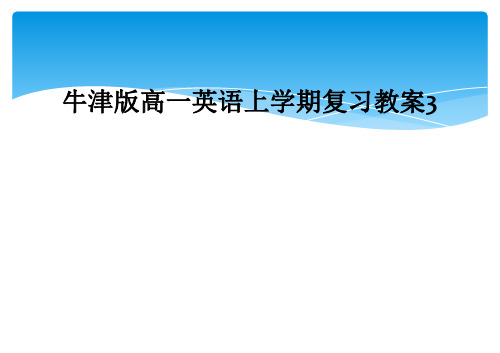
She has been talking about her new dress sincebreakfast. Have you two been fighting while I was away? 如果强调刚刚结束,可以加 just。例如: I’vejust been waving good-bye to them.
四、【交际英语】
问候和介绍 1.介绍: May I introduce myself? Allow me to introduce myself, my name is Peter. Mr. Lee, let me introduce Mr. Lin. I want you to meet my friend, Ed. This is my buddy, John. 2. 初次见面: How do you do? I’m pleased to meet you. I’m happy to make your acquaintance. I’m very glad to have the opportunity of meeting you. I’ve been looking forward to meeting you.牛津版高一英语上 Nhomakorabea期复习教案3
一、 重要单词: survey, rate(v), questionnaire, construct, ensure, confusion, ignore, precise, spe draft, inappropriate, humour, discount, apply, application, applicant, issu revised, statistics, analyze, recommend, major, possibility, finding, horror, Himala fur, hairy, imaginative, illustrate, source, organize, represent, event, entire.
牛津上海版必修一英语Unit1知识点专项讲解及练习

牛津上海版必修一英语Unit1知识点专项讲解及练习Unit 1 Eye Contact(reading)考点分析本章节是补充阅读材料,通过介绍在人际交往中眼神交流所起的重要作用,来进一步说明肢体语言的重要性,同时也帮助学生明确在不同文化背景中所表达的不同含义。
阅读目标:1知识目标:学习课文中重点词、词组、句型和语法。
2能力目标:提高学生的阅读理解能力和培养学生的阅读技巧。
3情感目标:启发学生对语言和文化之间关系的思考,进一步明确When you are in Rome, do asRomans do 的重要性。
专题详解词汇讲解1.far more +adj.far用在比较级前加强程度,除此以外,还有much, still, even, rather, a bit, a little, a little bit.i.e. Your health is much better than before. 你比以前健康多了。
2.the key to the door/study/the questionthe answer to the question 问题的答案the entrance to the hall 剧院的入口the bridge to the success (通向)成功的桥the solution to/of the problem 这个问题的解决方法3.maintain vt.1)keep up; continue 保持;维持;继续i.e. I maintain friendly relations (with) my former classmates. 我与老同学保持友谊。
2)keep in good repair or working order 保养i.e. It is our duty to maintain the roads. 保养道路是我们的职责。
3)defend 维护i.e. We must maintain our rights. 我们必须保护我们的权利。
高一上(牛津)期末复习

n. Internet/ focus/ communications/foundation/struggle/proposal/browser/process/lifestyle/satellite
worm/defense/loss/account/keyboard/ advance/appearance/calculation/benefit/password/simply
It’s straight ahead/ go down/ turn right/ It’s the first… on the left/ It’s opposite to
What’s your favourite programme? I’d like to see…
What programme would you like to see?
Unit 5: reservation
I’m sorry, what was … again? Could you please repeat that?
I disagree because./ I agree/ I agree strongly/ I’m in total disagreement with …/ I have the same opinion as/
Vocabulary & phrases
New Century Unit 5
n.sunshine/flock/scene/cart/sense/detective/couple/stage/symptom/tail/cage/companion/rat/mouse/rabbit/doorstep/stair/bunch/sweater/crowd/package/liver
上海牛津版英语高一第一学期

上海牛津版英语高一第一学期Chapter1.Body language-grammarLanguage一、章节分析(一)综述本章节主要语法---动名词在牛津英语中出现两次: 本课和高二(下)第一课。
本课主要介绍动名词作主语、动词宾语、介词宾语;高二(下)第一课主要介绍一些动词后接动名词和不定式的区别。
故本课不仅要介绍课本上动名词的基本用法,还应扩展动名词作真正主语用法,总结后接动名词作宾语的动词,归纳带介词to的动词短语,但不应挖得太深。
(二)目标学习动名词作主语、动词宾语、介词宾语和表语的基本用法。
(三)教学方法口语情景教学法( 教师创设情景,学生主要通过口语训练达到对语言知识的掌握)(四)重点和难点1A部分简单总结一些不含冠词的介词短语2B部分要细讲3C部分省略不讲二、教学设计(Teaching Designs)1Ask students to find the sentences which have the form of v.+ing in the text .(possible answers):He gave an encouraging smile.Communicating is more than speaking and listening.She is holding her head up.2Explain the meaning and features of gerunds.Gerunds are –ing nouns. It is a kind of nouns. So in the above sentences, only “communicating, speaking, and listening” are gerunds. As a noun, geru nds can be used as subject, verb object, preposition object, predicative and attributive.Step Two Presentation1Gerunds as subjects1)Example:T: What does shaking hands mean?S1: Shaking hands is a sign of friendship.S2: Shaking hands means that you are friendly.(动名词作主语时,位于动词用单数)2)PracticeStudents practise according to the example. They work in pairs. S1 makes questions using the pictures and turning the verbs in brackets into –ing nouns. S2 chooses answers from the box.Shaking your fist is a sign of anger.Sighing is a sign of sadness.Yawning means that you are sleepy.Closing your eyes means that you are thinking.Whistling means that you are happy.Scratching your head means that you are thinking.Bowing is a sign of respect.(补充讲解句型It is (was) no use/good doing something.)2Gerund as verb objects1)Example:T: I didn’t know you could swim.S: Didn’t you? I love/ like swimming.T: So do I. I really enjoy swimming.I don’t. I hate / dislike swimming.I prefer walking.2)Practice:Students work in pairs to make similar dialogues about the pictures. Follow the example.3)Tell students some other verbs which have such usages.admit, appreciate, avoid, be worth, complete, finish, deny, delay, postpone, escape,practice, suggest, miss, allow, permit, forbid, consider, imagine3Gerunds after prepositionsOn her first day at work, Debbie saw the things. She didn’t know what they were for, soshe asked Mr Yang.Work in pairs to complete their conversation. S2 should answer S1, using –ing nouns madefrom the verbs in the box along with “for”.1)Example:T: Excuse me, but what are these _keys_____ for?S: They’re _for____ __locking_____ the drawers of the desk.2)Practice:Students work in pairs to make similar dialogues about the pictures. Follow the example.S1: And this _______?S2: It’s _______ ________ letters.S1: What about these _______ ________?S2: They’re _______ ________ your paper together.S1: This ________. What’s it for?S2: It’s _______ _______ the dates on documents.S1: And these ________?S2: They’re _______ ________. They’re a present for your first day at work.( 补充总结含介词to的动词短语:be (get)used to, get down to, look forward to, lead to, pay attention to, be devoted to, object to例如:Let’s get down t o talking about your future.I’m look forward to hearing from you.)(见课件:gerund)[链接2]13)It’s worth doing…4)…can’t help doing…〖典型例句〗1)It’s no use crying over the spilt milk.2)The place is well worth visiting again.3)There is no point cheating in the exam.4)We can’t help laughing at the joke.5)It’s no good copying others’ homework.2下列动词后常接动名词做宾语1)admit, appreciate, avoid2)complete, consider3)delay, deny4)endure/stand, enjoy, escape, excuse5)finish6)imagine7)keep8)mind, miss9)postpone, practice10)resist, risk11)suggest巧记这些动词的诀窍:继续坚持勿停止;盼望完成莫推迟错过成功会后悔;惯于冒险须放弃避免原谅不逃脱;忙于欣赏禁不住介意练习很值得;考虑建议末延迟想象无用已无益;记得做过勿忘记禁止使用不定式〖典型例句〗1)I enjoy reading books in bed though it is not a good habit.2)I can’t imagine going to any place without you.3)Would you mind opening the door for me?4)He suggests reading English every day.5)The bird missed being shot.6)He escaped being punished by running away.3下列动词短语种to为介词1)be (get)used to2)get down to3)look forward to4)pay attention to5)be devoted to6)object to7)lead to〖典型例句〗1)I used to get up late, but now I’m used to getting up early.2)After discussing with his deskmate, he got down to writing his composition.3)I’m looking forward to hearing from you.以下几点可以在以后单元里讲解:1)need/ want / require 句型2)love, like, hate 后接 to do 与doing 作宾语的区别3)stop, remember, regret, try, mean, go on, forget后接 to do 与doing 作宾语的区别4)allow, permit, consider, advise后接 to do 与doing 作宾语和宾补的区别5)动名词的时态和语态6)动名词的复合结构[链接3]1.Do keeping _____, will you?A. to tryB. tryC. having triedD. trying2. We are all looking forward ______ Mr. Smith next week.A. to seeB. of seeingC. at seeingD. to seeing3. He spent all his time ______ for the final examination.A. to prepareB. of preparingC. in preparingD. to preparing4. The boy is only five years old, but he is quite used _____ the telephone.A. to answerB. to answeringC. of answeringD. by answering5. ______soundly is better for your illness than taking medicine.A. To sleepB. SleepingC. SleepD. Having slept6. Sometimes when I look into the sky, I feel like ______ a trip somewhere.A. to makeB. makingC. makeD. to go for7. I consider _____ of every fish is a kind of murder.A. takingB. a takingC. the takingD. to take8. My grandfather is a rich man, but ______ money does not solve all his problems.A. hasB. to haveC. havingD. having had9. It is no good ______ him to see you off.A. to expectB. expectingC. of expectingD. for him to expect10.There is one more book worth ______.A. readB. of readingC. being readD. reading11.He liked ______ many questions at the press conference.A. being askedB. askingC. of askingD. ask12.We had no trouble ______ the path through the forest.A. to findB. for findingC. findingD. with findingII.用括号里的动词的正确形式填空:1. He insisted on _______(do )the work in some other way.2. The windows want / need / require to be cleaned. That is, they need / want / require _____(clean).3. He practiced _______(play) the piano every day.4. She doesn’t mind ______( work ) overtime.5. It will mean ______( benefit ) your company and mine.6. Have you decided to put off ______( go ) to the seaside?7. Peter kept (on) ______ (ask) questions.8. It’s a waste of time ______( argue) about it.9. _____ ( talk ) is easier than doing.10. Have you finished _______ (do) your homework?III.翻译:1. ______(每天晨读一刻钟)is very important in learning English.2. It’s no use _______(叹气).3. Debbie enjoys _______(微笑着与客户交流).4. John has just given up ______(吸烟).5. I ______(一直盼望着访问)China again.6. He run off to avoid ______(看见)by his class teacher.7. This machine is for ______(切纸).8. This book is well worth ______(读).9. ______(挥动拳头)is a sign of anger.10. Mr. Yang suggested/advised ______ (看着顾客的眼睛)to make a good impression on him. IV.拓展题:1.---You were brave enough to raise objections at the meeting.---Well, now I regret _____that.A. to doB. to be doingC. to have doneD. having done2.The patient was warned _____ oily food after the operation.A. to eat notB. eating notC. not to eatD. not eating3.She looks forward every spring to _____ the flower-lined garden.A. visitB. paying a visitC. walk inD. walking in4.The little time we have together we try _____ wisely.A. spending itB. to spend itC. to spendD. spending that5.While shopping, people somet imes can’t help ______ into buying something they don’t really need.A. to persuadeB. persuading D. being persuaded D. be persuaded6.What worried the child most was ______ to visit his mother in the hospital.A. his not allowingB. his not being allowedC. his being not allowedD. having not been allowed7.Tony was very unhappy for _____ to the party.A. having not been invitedB. not having invitedC. having not invitedD. not having been invited8._____ to sunlight for too much time will do harm to one’s skin.A. ExposedB. Having exposedC. Being exposedD. After being exposed9.The discovery of new evidence led to _____.A. the thief having caughtB. catch the thiefC. the thief being caughtD. the thief to be caught10.One learns a language by making mistakes and _____ them.A. correctB. correctingC. correctsD. to correct11.---You should have thanked her before you left.---I meant _____, but when I was leaving I couldn’t find her anywhere.A. to doB. toC. doingD. doing12.In some parts of London, missing a bus means_____ for another hour.A. waitingB. to waitC. waitD. to be waiting13.---What’s made John so angry?---______ the tickets for the concert.A. LoseB. To loseC. Because of losingD. Losing14. The day we are looking forward to _______ at last.A. arrivingB. arriveC. arrived D. arrives15. Mr. Reed made up his mind to devote all he had to ____ some schools for poor children.A. set upB. setting upC. have set upD. having set up附答案:Ⅰ.单选:DDCBBBCCBDBCⅡ.用括号里的动词的正确形式填空:doing, cleaning, playing, working, benefiting,going, asking, arguing, Talking, doingⅢ.翻译:1.Reading for a quarter of an hour every morning2.sighingmunicating with customers with a smile4.smoking5.am looking forward to visiting6.being seen7.cutting up paper8.reading9.Shaking one’s fist10.looking at customers’ eyesⅣ.拓展题:DCDBD BDCCB BADCBChapter2. Care for hair-More Reading教案一、章节分析(Reading section)(一)阅读地位(Reading Position)1)more language input同样围绕着头发这个主题,但给学生提供了一些额外的相关信息。
牛津高一英语复习提纲[1]
![牛津高一英语复习提纲[1]](https://img.taocdn.com/s3/m/fb4a1cec524de518964b7d9b.png)
必修一UNIT1【词汇】1. attend vt. 参加,出席。
强调动作,而be present则强调状态attend the meeting /school /weddingattend to 注意,专心于You must attend to what you are doing.2. earn vt. 赢得,获得earn money 赚钱earn one‘s living 谋生They must earn lots of money.He earns his living by selling vegetables.3. respect n/v. 尊重,敬重We have high respect for him.He is respected by everyone.当作为名词复数使用时,表示―敬意,问候‖相当于regards Give my best respects to your family.4. achieve 取得;完成achieve success/ victory比较:achieve, reach, gainachieve 强调了由于极大的努力,克服困难后达到既定目标。
They achieved their purpose through a series of experiment.reach 指到达某地方,达到目的,而不涉及为此所花费的努力。
Few finishing line in the obstacle course. (障碍跑)gain ―获得‖,指获得某种好处、利益或经验Nothing can be gained without an effort.5. miss作为错过时,后面可接名词,动名词,但不能接不定式The thief missed being caught. (√)The thief missed to be caught. (╳)6. experience 经历,体验①v. 经历,体验have you experienced real hunger?②n. 作为―经历‖是可数名词,作为―经验‖是不可数名词Can you tell us something about your experiences in Africa.He is a teacher with five year‘s experience.③experienced 是形容词。
- 1、下载文档前请自行甄别文档内容的完整性,平台不提供额外的编辑、内容补充、找答案等附加服务。
- 2、"仅部分预览"的文档,不可在线预览部分如存在完整性等问题,可反馈申请退款(可完整预览的文档不适用该条件!)。
- 3、如文档侵犯您的权益,请联系客服反馈,我们会尽快为您处理(人工客服工作时间:9:00-18:30)。
C
1.您可联系校办公室了解更多信息。
(contact)
【答案】72. You can contact the school office for more information.
【答案解析】
Contact
n. 接触; 触点; [医] (传染病)接触人; 门
路;
vt. 使接触; 与…联系; 与…通讯(或通话);
vi. 联系,接触;
[例句]Opposition leaders are denying any contact with the government in Kabul
反对派领袖否认与喀布尔政府有任何联系。
2. 这是他第一次一本正经地评价我的衣着。
(comment)
【答案】This/It is the first time that he has commented on / has made comments on my clothes seriously.
【答案解析】
Comment
n. 评论; 注释; 意见;
vt 评论,谈论;
vt. 表达意见; 解释,注释;
[例句]So far, Mr Cook has not commented on these reports
到目前为止,库克先生仍未就这些报道发表评论。
3. 最让我担心的是这孩子除了在线游戏之外,似乎对周围的一切都视而不见。
(concern)
【答案】What concerns me most is that the kid seems to be blind to / to turn a blind eye to everything around him but online games.
【答案解析】
Concern
vt. 涉及,关系到; 使关心,使担忧; 参
与;
n. 关心; 关系,有关; 顾虑; 公司或企
业;
[例句]The group has expressed concern about reports of political violence in Africa
该团体对有关非洲政治暴力的报道表示关切。
4. 乐观的人不会过分怀念美好的旧时光,因为他们正忙着创造新的回忆。
(create)
Optimistic people don’t miss the good old days too much, because they are busy creating new memories.
5.在团队精神的鼓舞下,研究小组的每个成员都为新项目做出了自己的贡献。
(contribution)
Inspired by the team spirit , every member of the research group made his contributions to the new project .
知识点:时态语态
【知识梳理1】基本概念
1. 动词时态的概念:
英语中有16种时态,
但高中阶段较常用的有10种:___________, ___________, ___________, ___________,
___________,___________, ___________, ___________, ___________, ___________.
【keys】一般现在时,一般过去时,一般将来时,过去将来时,现在进行时,过去进行时,过去完成时,现在完成时将来完成时,和现在完成进行时
2. 动词语态的概念:
英语的语态有主动语态和被动语态。
主动语态中主语是动作的______。
被动语态(passive voice)是动词的一种形式。
被动语态中主语是动作的________ 。
例:They always help you. 他们总是帮助你。
(主动)
You are always helped by them 你总是被他们帮助。
(被动)
【keys】执行者;承受者;
【知识梳理2】时态讲解
一般过去时和现在完成时
(1)一般过去时。
